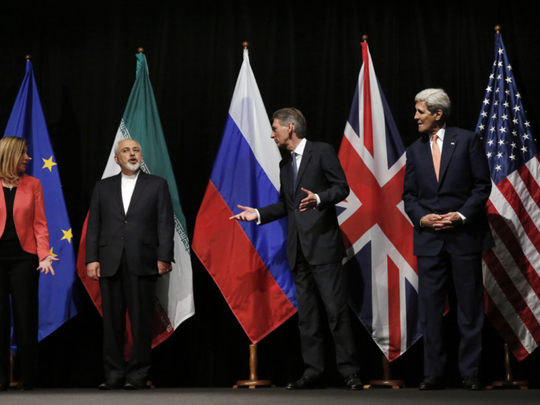
The European political project is looking rather shaky in the wake of the will-they-or-won’t-they Greek bailout. But you would never know it from the Iran deal announced on Tuesday. In its fine print, the nuclear pact gives the European Union (EU) the immediate power to make the treaty into an offer the United States cannot refuse. And it gives the EU the crucial vote in determining whether Iran is complying with its promise not to make a nuclear weapon.
Start with the outsize role the EU has in, essentially, forcing Congress to ratify the Iran deal. Paragraph 19 of the treaty says the EU will terminate sanctions when Iran implements its side of the deal, as judged by International Atomic Energy Agency (IAEA). That means if Iran decides it wants the deal, the EU is committed to ending sanctions. And an end to EU sanctions means, in practical terms, an end to US leverage on Iran. A sanctions regime is close to useless without European participation.
In other words, even if Congress were somehow to block the US from approving the deal by overriding a presidential veto, Iran and the EU could just go ahead with the same deal and ignore the US. Iran would get most of what it wants, namely an end to economic sanctions.
That is why the US cannot really refuse the deal. The coming debate in Congress may have the appearance of partisan drama. But do not be fooled: You will be watching a shadow play. No doubt US President Barack Obama and his administration are a bit relieved that this provision is in the treaty, because it effectively guarantees success. And its supporters are already somewhat shamelessly pointing to Paragraph 19 as a reason for Congress to approve the deal.
But you can see how the EU members also benefit. Most of them never wanted to sanction Iran in the first place. The EU is at its most cohesive when its members’ economic interests overlap — and from an economic point of view, none of them wanted to lose trade with Iran. EU sanctions against Iran were the product of intense US pressure to get the EU to put an American political interest ahead of trade. Now the EU will be thrilled to get back to business.
Then there is the verification role that the deal gives the EU going forward. According to Paragraph 78, if the IAEA is not satisfied with Iran’s compliance, it must go to a “Joint Commission” of eight members. The commission can “advise on the necessary means to resolve the IAEA’s concerns” — if and only if at least five members agree.
Iran is a member of the commission, as is Russia and China — so it is likely that three votes would almost automatically take the Iranian side in any dispute with the IAEA. That leaves the other members of the joint commission — France, Germany, US, Britain and the EU itself. The US can be expected to side with the IAEA and it is likely that its traditional European allies would agree. That gives the decisive fifth vote to the EU.
No doubt the US assumes that the EU will do what its most powerful and important members want. Seen in this light, the treaty is using the EU as a kind of proxy mechanism to give the US the capacity to push Iran not to defy IAEA inspectors. But as the events surrounding the Greece bailout have recently shown, the EU is not only France, Germany and Britain. Other member states have leverage on selected issues. And arcane inner processes dictate how the EU makes foreign policy decisions.
The EU faces major political challenges in the near term: Greek exit from the Eurozone; British exit from the EU; Russian aggression, particularly in Ukraine; and the price of migration from North Africa.
One of these challenges — Greek exit — has been forestalled. But the anger and resentment that the bailout process engendered, especially between Germany and Greece, bodes ill for the EU as a political body, rather than a common economic market. The Iran deal treats the EU as an important global player. Here is hoping that trust is justified.
— Washington Post









